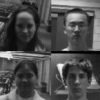Free Online Productivity Tools
i2Speak
i2Symbol
i2OCR
iTex2Img
iWeb2Print
iWeb2Shot
i2Type
iPdf2Split
iPdf2Merge
i2Bopomofo
i2Arabic
i2Style
i2Image
i2PDF
iLatex2Rtf
Sci2ools
CVPR
2008
IEEE
2008
IEEE
On the use of independent tasks for face recognition
We present a method for learning discriminative linear feature extraction using independent tasks. More concretely, given a target classification task, we consider a complementary classification task that is independent of the target one. For example, in face classification field, subject recognition can be a target task while facial expression classification can be a complementary task. Then, we use labels of the complementary task in order to obtain a more robust feature extraction, being the new feature space less sensitive to the complementary classification. To learn the proposed feature extraction we use the mutual information measure between the projected data and both labels from the target and the complementary tasks. In our experiments, this framework has been applied to a face recognition problem, in order to inhibit this classification task from environmental artifacts, and to mitigate the effects of the small sample size problem. Our classification experiments show an imp...
Complementary Classification Task | Complementary Task | Computer Vision | CVPR 2008 | Feature Extraction | Robust Feature Extraction | Target Classification Task |
Related Content
| Added | 12 Oct 2009 |
| Updated | 28 Oct 2009 |
| Type | Conference |
| Year | 2008 |
| Where | CVPR |
| Authors | Àgata Lapedriza, David Masip, Jordi Vitrià |
Comments (0)

